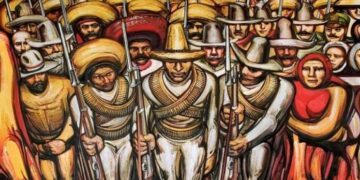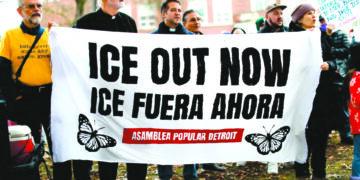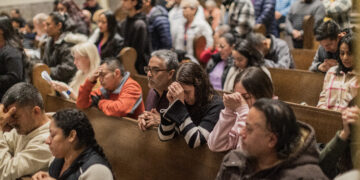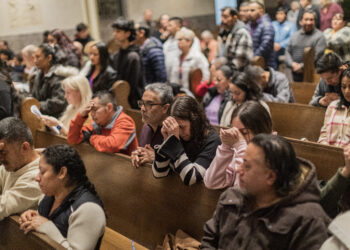George Carrillo, CEO of the Hispanic Construction Council, visited Detroit last week with a clear message: Latinos are essential to building America’s future, and Michigan is at a pivotal moment in that fight.
Carrillo has spent the last several months traversing the country, utilizing data, research, and policy advocacy to raise awareness about the vital role of Latinos in the construction industry. In this moment of heightened tension around immigration and controversial immigration enforcement in the country, he has been meeting with general contractors, nonprofit leaders, and policymakers to discuss the country’s deepening labor shortage and the need for immigration reform that recognizes the contributions of undocumented workers.
“We’re about 500,000 workers short in the construction industry right now,” Carrillo said. “That affects everything from housing to infrastructure. It’s delaying projects, driving up costs, and threatening the stability of an industry that supports over $2.4 trillion in economic activity.”
Carrillo’s visit comes just months after the Hispanic Construction Council released a national study on the impact of Latinos in construction. In September, the organization will publish a 50-state report ranking how Hispanics fare across the U.S., based on revenue, project completion, and workforce development.
At Real Talk, a monthly gathering launched by Tanya Saldivar-Ali and Luis Ali of AGI Construction, which creates space for Detroit’s BIPOC contractors to connect and collaborate, Carrillo promoted the council’s Building America Stronger legislative proposal.
The proposal would create a work visa for undocumented immigrants already living in the U.S., potentially generating over $50 million in new tax revenue. The plan would reinvest that money into workforce development programs to train the next generation of builders, with a focus on underserved youth.
“This is about stabilizing the workforce,” Carrillo said. “We’re not just pointing out the problem, we’re bringing a solution.”
Detroit’s Unique Role—and Challenges
Carrillo noted that Detroit faces the same systemic barriers as other regions, particularly in terms of immigration enforcement and its impact on the local construction industry.
“Detroit’s proximity to the Canadian border means there’s a different kind of fear here,” he said. “There’s a strong ICE presence, and small business owners feel it. It’s not just about the worker shortage—it’s also about intimidation and uncertainty.”
Those dynamics, he said, are holding back the full potential of Detroit’s booming construction sector. “People here want to build. They want to hire. But they’re struggling to find skilled labor, and the fear around immigration policy only makes that harder.”
Policy, Language, and the Fight for Reform
A former police officer, Carrillo believes language matters when advocating for change. “We’re a country of laws. So let’s be clear, most immigration violations are civil, not criminal. Yet people are being shackled and detained like they’re violent offenders. That’s not justice.”
Carrillo uses that clarity to push lawmakers on both sides of the aisle to look beyond the politics. “We support removing criminals, but we also believe good, hardworking immigrants should have a chance to stay, contribute, and build a future here. That shouldn’t be a partisan issue.”
He argues that if construction collapses, so does the country. “Infrastructure is what separates us from a third-world nation. If we don’t have the workforce to maintain it, we’re in real trouble.”
And to Latino communities across the U.S., Carrillo offers a message of unity and urgency.
“This is our time,” he said. “Just like the Black community rose up after George Floyd, Latinos must come together, regardless of politics, and demand humane, common-sense policies. We need to break out of our cultural norms and speak with one voice. Because the stronger we are as a community, the stronger we are as a nation.”
This article was made possible thanks to a generous grant to EL CENTRAL Hispanic News by Press Forward, the national movement to strengthen communities by reinvigorating local news. Learn more at www.pressforward.news.
Es nuestro momento: Un líder latino nacional de la construcción visita Detroit para destacar la crisis laboral y proponer soluciones políticas
George Carrillo, director ejecutivo del Hispanic Construction Council (Consejo Hispano de la Construcción), visitó Detroit la semana pasada con un mensaje claro: los latinos son esenciales para construir el futuro de Estados Unidos, y Michigan se encuentra en un momento crucial en esa lucha.
Carrillo ha pasado los últimos meses recorriendo el país, utilizando datos, investigación y promoción de políticas para crear conciencia sobre el papel vital de los latinos en la industria de la construcción. En este momento de creciente tensión en torno a la inmigración y la controvertida aplicación de la ley migratoria en el país, se ha reunido con contratistas, líderes de ONG y legisladores para abordar la creciente escasez de mano de obra en el país y la necesidad de una reforma migratoria que reconozca las contribuciones de los trabajadores indocumentados. “Actualmente, tenemos un déficit de aproximadamente 500,000 trabajadores en la industria de la construcción”, dijo Carrillo. “Esto afecta todo, desde la vivienda hasta la infraestructura. Está retrasando proyectos, elevando los costos y amenazando la estabilidad de una industria que sustenta más de $2.4 billones en actividad económica”.
La visita de Carrillo se produce apenas unos meses después de que el Consejo publicara un estudio nacional sobre el impacto de los latinos en la construcción. En septiembre, la organización publicará un informe de los 50 estados que clasifica la situación de los hispanos en Estados Unidos, según sus ingresos, la finalización de proyectos y el desarrollo de la fuerza laboral.
En Real Talk, una reunión mensual impulsada por Tanya Saldivar-Ali y Luis Ali de AGI Construction, que crea un espacio para que los contratistas BIPOC de Detroit se conecten y colaboren, Carrillo promovió la propuesta legislativa del consejo, “Construyendo un Estados Unidos más Fuerte”.
Esta propuesta crearía una visa de trabajo para inmigrantes indocumentados que ya viven en Estados Unidos, lo que podría generar más de $50 millones en nuevos ingresos fiscales. El plan reinvertiría ese dinero en programas de desarrollo laboral para capacitar a la próxima generación de constructores, con un enfoque en los jóvenes desfavorecidos.
“Se trata de estabilizar la fuerza laboral”, dijo Carrillo. “No solo estamos señalando el problema, estamos aportando una solución”.
El rol único de Detroit y sus desafíos
Carrillo señaló que Detroit enfrenta las mismas barreras sistémicas que otras regiones, particularmente en términos de control migratorio y su impacto en la industria local de la construcción.
“La proximidad de Detroit a la frontera con Canadá significa que aquí hay un tipo de miedo diferente”, dijo. “Hay una fuerte presencia de ICE, y los dueños de pequeños negocios lo perciben. No se trata solo de la escasez de trabajadores, sino también de intimidación e incertidumbre”.
Esas dinámicas, dijo, están frenando todo el potencial del floreciente sector de la construcción de Detroit. “La gente aquí quiere construir. Quiere contratar. Pero tienen dificultades para encontrar mano de obra calificada, y el miedo en torno a la política migratoria solo lo dificulta”.
Política, lenguaje y la lucha por la reforma
El ex oficial de policía, Carrillo cree que el lenguaje es importante al abogar por el cambio. “Somos un país de leyes. Seamos claros: la mayoría de las violaciones migratorias son civiles, no penales. Sin embargo, se encadena y detiene a las personas como si fueran delincuentes violentos. Eso no es justicia”.
Carrillo usa esa claridad para impulsar a los legisladores de ambos partidos a mirar más allá de la política. “Apoyamos la deportación de delincuentes, pero también creemos que los inmigrantes buenos y trabajadores deben tener la oportunidad de quedarse, contribuir y construir un futuro aquí. Eso no debería ser un asunto partidista”.
Argumenta que, si la construcción colapsa, también colapsa el país. “La infraestructura es lo que nos distingue de una nación en desarrollo. Si no tenemos la fuerza laboral para mantenerla, estamos en serios problemas”.
Y a las comunidades latinas de todo Estados Unidos, Carrillo les ofrece un mensaje urgente de unidad.
“Este es nuestro momento”, dijo. Al igual que la comunidad negra se alzó tras George Floyd, los latinos debemos unirnos, independientemente de nuestra ideología política, y exigir políticas humanas y sensatas. Necesitamos romper con nuestras normas culturales y hablar con una sola voz. Porque cuanto más fuertes seamos como comunidad, más fuertes seremos como nación.
Este artículo fue posible gracias a una generosa subvención a EL CENTRAL Hispanic News por parte de Press Forward, el movimiento nacional que busca fortalecer las comunidades revitalizando las noticias locales. Más información en www.pressforward.news.
Traducción Carmen Elena Luna












































